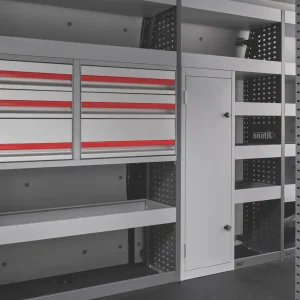Upon its arrival in 2016 Citroen’s former UK boss Alex Smith described the Dispatch as the brand’s most important launch for two decades.
Economical, practical and versatile, the Dispatch can hold its own against formidable competitors such as the Ford Transit Custom, Renault Master, Vauxhall Vivaro and VW Transporter – not to mention its sibling models, the Peugeot Expert and Toyota Proace that share its platform in Sevelnord, France.
The Dispatch impressed What Van? so much we crowned it our LCV of the Year for 2017, alongside the Expert and Proace, and the models retained the Medium Van prize for 2018.
So having propelled Citroen back into the heart of the crucial medium van segment where it had underperformed for too long with the previous generations of the van, the Dispatch is now becoming firmly established. Last year it was the sixth most popular medium van in the UK, snapping at the heels of the fifth-placed Mercedes-Benz Vito (6,472 units sold) with sales of 5,897, according to the Society of Motor Manufacturers and Traders (SMMT), and was the 18th best-selling LCV in the market overall.
Kris Cholmondeley – Citroen’s head of business sales – explains that the new Dispatch has been a great success for the manufacturer in more ways than one and acknowledges that What Van?’s recognition of the model’s qualities had assisted this process.
“Firstly, it has proved to be a phenomenal sales success, with UK sales rising 32% compared with 2016, while sales in the medium van sector overall fell by 10%,” he says.
“Then that success was endorsed by What Van? with the new Dispatch winning the magazine’s Light Commercial Vehicle of the Year award in 2017, and Medium Van of the Year in 2017 and 2018.”
“Independent endorsement of any of our vehicles is always a great help to our dealer and fleet sales teams, and the What Van? Awards no doubt helped underline the stylish new Dispatch’s class-leading credentials.”
Cholmondeley claims the Dispatch has continued to perform strongly this year, helping to push up Citroen’s sales by 5.4% in the year to the end of April in a market that has dropped by 2.3% overall.
But it’s not all about the brand’s medium van – Citroen used the Commercial Vehicle Show in April to introduce the industry to its revised Ready To Run conversion programme, which is based on the Relay large van and currently includes tipper, dropside, box, Luton, low-floor Luton and curtainside versions.
A year ago Citroen and its PSA partner Peugeot brought its conversion operations together under one roof.
Richard Abbott, head of Specialist Fleets (the two brands supply 500 vans between them a year for ambulance conversions used for patient transfer services) tells What Van? Citroen and Peugeot assessed all their converter partners 12 months ago for quality and servicing support before drawing up a revised approved list.
Three of the higher-volume partners are Ingimex, which converts dropsides and tippers, JC Payne, which provides Luton, box and curtainside bodies, and Trucksmith, which produces the low-floor Luton. Trucksmith produces similar bodies for Renault and also Vauxhall, a brand PSA bought last year.
Tipmaster is still validated to carry out tipper conversions but does not have the capacity to do as many as Ingimex, says Abbott.
All models in the Ready To Run conversion range conform to either European Whole Vehicle or National Small Series Type Approval and all are also included in the Citroen LCV price list and carry a three-year/100,000-mile warranty covering the whole vehicle.
Abbott explains that each conversion is issued with a Cap ID code, which means they are viable for leasing to customers.
He says historically Citroen has turned out 1,300 conversions a year but that the ambition was to increase the rate to 3,000 by the end of 2019. He also remarks that Citroen has traditionally been more successful in targeting SMEs while Peugeot has focused more on large fleets.
With PSA’s purchase of Opel/Vauxhall it would seem to be a logical move for the French brands to make use of Vauxhall’s existing conversion facility at its plant in Luton, but this is not a matter Citroen was willing to confirm at the time of writing.
An initiative Citroen is driving through its dealer network, which consists of 175 sites, including 65 Business Centres dealing with fleets of up to 50 LCVs, is its Free2Move fleet management operation for leasing customers. Cholmondeley says the system has been inherited from larger fleets with the aim of reducing running costs.
“Free2Move introduces telematics to SMEs to reduce downtime,” he says, adding that the aim is to open another 10 Business Centres this year.
Cholmondeley also reveals that a new Berlingo light van will be launched this year but stresses that the current model, despite being long in the tooth, continues to do very nicely. He adds that interest in the Electric Berlingo will “gather pace” in 2019 but forecasts 300 registrations for this year.

Electric avenues
Head of electric vehicles for PSA Helen Loos will drive the EV strategy, including a version of Free2Move – Connect Fleet – for plug-in fleets.
She claims telematics can help with easing the transition to electric vehicles in terms of monitoring mileage coverage and encouraging more economical driving styles.
“Range is the key factor,” she says. “They (fleets) want a guarantee the van is fit for purpose.”
Loos claims 90% of journeys vans undertake are for distances under 70 miles, which means an electric van is suitable for the job. She says Citroen is focused on developing both full-electric and self-charging hybrid technology and claims within five years 80% of the LCV line-up will include some form of electric option. Within seven years Loos asserts this will rise to 100% of the product portfolio.
But she says plug-in hybrids are not likely to come into the picture and argues that full-electric technology is better suited to vans.
Loos admits PSA has historically not had a strong focus on electric vans.
“I’ve been in the role two years – prior to this there was no EV specialist,” she points out.
She predicts the majority of electric van customers will be large corporate fleets, which suggests there may be a bias towards Peugeot over Citroen. She says large fleets must abide by corporate responsibility policies (including reducing emissions) and need to be “seen to be green”.
Loos says Electric Berlingo vans will usually be higher specification, such as Enterprise, and come with telematics systems as standard to assist with route guidance and range.
For small business customers in particular she says the retail network has a crucial role to play in marketing electric vans.
“A lot [of the process of building electric van demand] is in working with the dealer network. They don’t see so much incoming demand [for electric vans] as for diesel.”
With high staff turnover a major issue within the motor retail trade, Loos says a majorchallenge is in ensuring employees are properly trained to sell electric vans.
Fleet afoot
Citroen has built its stronghold in the small business sector of the LCV market but is increasingly focusing on larger fleets too.
In January, leasing firm Alphabet supplied 156 Berlingo and 10 Dispatch crew vans to food condiment company McCormick’s commercial fleet through a partnership with Citroen. The vehicles replace an earlier fleet of Berlingo crew vans, which had been in service since 2013. All the vehicles are being funded and supplied by Alphabet on three-year fully maintained contracts, including tyres, and sourced through Citroen dealer Robins and Day London West.
Both the Berlingo and Dispatch models are fitted with Teletrac Navman telematics systems and parking sensors. The vans also come with air conditioning.
Tracey Hoare, regional business controller south for McCormick, says: “The key benefits of the fleet for us are enhanced safety, flexibility and efficiency for our merchandising team. It will also help them with dynamic journey-planning.
“When the vehicles are fully loaded, there are no weight issues, no matter what the mix of products carried is. In addition, these vehicles are equipped with the moveable bulkhead, which gives the safety and flexibility we require.
“Finally, the fact that the standard Berlingo is equipped with Teletrac Navman’s navigation and tracker system was very attractive to us from a safety point of view and knowing where individuals are.”
Steph Brown, corporate sales manager for Alphabet, says: “Alphabet undertook a detailed whole-life cost analysis with several manufacturers and worked closely with McCormick to ensure their LCV requirements for both today and in the future were achieved.
“Citroen proved to be the most cost-efficient and was a tried-and-tested solution in the McCormick LCV fleet.”
PSA Group fleet director Martin Gurney says: “Repeat business is a genuine measure of customer satisfaction and it’s important to us that McCormick has chosen the Berlingo crew van again and also added the Dispatch crew van to its national fleet.”
In another repeat deal, at the end of 2017 Hackney Council in east London replaced its fleet of Citroen vans with 250 new models. It has taken delivery of 150 Berlingos, 40 Dispatch vans, 20 Relay vans and 40 Relay cage-bodied tippers, some of which are equipped with tail lifts.
All of the vans come with load area ply-lining and equipment options include beacon bars, roof racks, pipe carriers, and Chapter 8-compliant high-visibility rear chevron markings. Some of the tippers are fitted with beacons, tool boxes and tail lifts. The council took the decision to renew its fleet with Citroen vans due to their facility to run on high-blend sustainable biofuel produced from waste.





